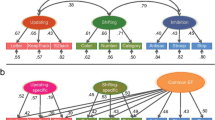Abstract
The present study was conducted to examine the inhibitory deficit theory on cognitive performance in old age. An experimental manipulation was applied to investigate if the efficiency of inhibitory control directly affects age-related working memory performance as measured by the operation span task. Forty-two older (M = 67 years, SD = 5.12) and 42 younger adults (M = 25 years, SD = 4.06) performed two versions of the operation span task that differed in the inhibitory demands placed on working memory. Age effects were confirmed for both versions of the operation span task. Importantly, the age effect was qualified by an age × inhibitory demands interaction indicating that age differences in the high inhibitory-demands condition were even larger than in the standard condition. In conclusion, this supports the assumption that inhibitory deficits contribute to age-related working memory performance.
Similar content being viewed by others
Notes
Due to a violation of homogeneity of regression, the variable years of education could not be used as covariate.
References
Botvinick MM, Braver TS, Barch DM, Carter CS, Cohen JD (2001) Conflict monitoring and cognitive control. Psychol Rev 108:624–652
Bopp KL, Verhaeghen P (2005) Aging and verbal memory span: a meta-analysis. J Gerontol Psychol Sci 60B:P223–P233
Bowles RP, Salthouse TA (2003) Assessing the age-related effects of proactive interference on working memory tasks using the Rasch model. Psychol Aging 18:608–615
Bunting M (2006) Proactive interference and item similarity in working memory. J Exp Psychol Learn Mem Cogn 32:183–196
Chiappe P, Hasher L, Siegel LS (2000) Working memory, inhibitory control, and reading disability. Mem Cogn 28:8–17
Connelly SL, Hasher L, Zacks RT (1991) Age and reading: the impact of distraction. Psychol Aging 6:533–541
Conway ARA, Engle RW (1996) Individual differences in working memory capacity: more evidence for a general capacity theory. Memory 4:577–590
Conway ARA, Kane MJ, Bunting MF, Hambrick DZ, Wilhelm O, Engle RW (2005) Working memory span tasks: a methodological review and user’s guide. Psychon Bull Rev 12:769–786
Craik FIM (2000) Age-related changes in human memory. In: Park DC, Schwarz N (eds) Cognitive aging: a primer. Psychology Press, Philadelphia, pp 75–92
Daneman M, Merikle PM (1996) Working memory and language comprehension: a meta-analysis. Psychon Bull Rev 3:422–433
Dobbs AR, Rule BG (1989) Adult age differences in working memory. Psychol Aging 4:500–503
Dougherty MRP, Hunter JE (2003) Hypothesis generation, probability judgment, and individual differences in working memory capacity. Acta Psychol 113:263–282
Harris JL, Qualls CD (2000) The association of elaborative or maintenance rehearsal with age, reading comprehension, and verbal working memory performance. Aphasiology 14:515–526
Hasher L, Zacks RT (1988) Working memory, comprehension, and aging: a review and a new view. In: Bower GH (ed) The psychology of learning and motivation: advances in research and theory, vol 22. Academic, San Diego, pp 193–225
Hasher L, Stoltzfus ER, Zacks RT, Rypma B (1991) Age and inhibition. J Exp Psychol Learn Mem Cogn 17:163–169
Jarrold C, Towse JN (2006) Individual differences in working memory. Neuroscience 139:39–50
Kliegel M, Phillips LH, Lemke U, Kopp U (2005) Planning and realization of complex intentions in Parkinson patients. J Neurol Neurosurg Psychiatry 76:1501–1505
Lehrl S (1977) Der Mehrfachwahlwortschatztest MWT-B. Straube, Erlangen
Lustig C, May CP, Hasher L (2001) Working memory span and the role of proactive interference. J Exp Psychol Gen 130:199–207
May CP, Hasher L, Kane MJ (1999) The role of interference in memory span. Mem Cogn 27:759–767
McDowd JM (1997) Inhibition in attention and aging. J Gerontol Psychol Sci 52B:P265–P273
McDowd JM, Oseas-Kreger DM, Filion DL (1995) Inhibitory processes in cognition and aging. In: Dempster FN, Brainerd CJ (eds) Interference and inhibition in cognition. Academic, San Diego, pp 363–400
Miyake A, Friedman NP, Emerson MJ, Witzki AH, Howerter A, Wager TD (2000) The unity and diversity of executive functions and their contributions to complex “frontal lobe” tasks: a latent variable analysis. Cogn Psychol 41:49–100
Mueller ST, Seymour TL, Kieras DE, Meyer DE (2003) Theoretical implications of articulatory duration, phonological similarity, and phonological complexity in verbal working memory. J Exp Psychol Learn Mem Cogn 29:1353–1380
Park DC (2000) The basic mechanisms accounting for age-related decline in cognitive function. In: Park DC, Schwarz N (eds) Cognitive aging: a primer. Psychology Press, Philadelphia, pp 3–21
Phillips LH, Hamilton C (2001) The working memory model in adults aging research. In: Andrade J (ed) Working memory in perspective. Psychology Press, Philadelphia, pp 101–125
Reuter-Lorenz PA, Marshuetz C, Jonides J, Smith EE, Hartley A, Koeppe R (2001) Neurocognitive ageing of storage and executive processes. Eur J Cogn Psychol 13:257–278
Rowe G, Hasher L, Turcotte J (2006) Here today, gone tomorrow: eliminating age differences on a working memory task. Poster presented at the Cognitive Aging Conference 2006, Atlanta, Georgia, USA
Schelstraete M-A, Hupet M (2002) Cognitive aging and inhibitory efficiency in the Daneman and Carpenter’s working memory task. Exp Aging Res 28:269–279
Shaw RJ (1991) Age related increases in the effects of automatic semantic activation. Psychol Aging 6:595–604
Stoltzfus ER, Hasher L, Zacks RT (1996) Working memory and aging: current status of the inhibitory view. In: Richardson JTE, Engle RW, Hasher L, Logie RH, Stoltzfus ER, Zacks RT (eds) Working memory and human cognition. Oxford University Press, New York, pp 66–88
Turley-Ames KJ, Whitfield MM (2003) Strategy training and working memory task performance. J Mem Lang 49:446–468
Turner ML, Engle RW (1989) Is working memory capacity task dependent? J Mem Lang 28:127–154
Zacks RT, Hasher L (1997) Cognitive gerontology and attentional inhibition: a reply to Burke and McDowd. J Gerontol Psychol Sci 52B:P274–P283
Zacks RT, Hasher L, Li KZH (2000) Human memory. In: Craik FIM, Salthouse TA (eds) The handbook of aging and cognition. Erlbaum, Mahwah, pp 293–357
Zeintl M, Kliegel M (2007) How do verbal distractors influence age-related operation span performance? A manipulation of inhibitory control demands. Exp Aging Res 33:163–175
Author information
Authors and Affiliations
Corresponding author
Rights and permissions
About this article
Cite this article
Zeintl, M., Kliegel, M. The role of inhibitory control in age-related operation span performance. Eur J Ageing 4, 213–217 (2007). https://doi.org/10.1007/s10433-007-0066-0
Published:
Issue Date:
DOI: https://doi.org/10.1007/s10433-007-0066-0




